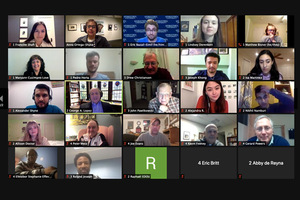
On January 27, The Bulletin of the Atomic Scientists announced that the iconic Doomsday Clock would remain at 100 seconds from midnight. This measurement, the closest to midnight the clock has ever been, emphasizes that the combined threats of climate change and unchecked nuclear weapons proliferation loom larger than ever.
Just weeks before this announcement, Kroc Institute for International Peace Studies faculty partnered with Catholic organizations and faculty across the globe to host a virtual seminar for students and faculty focused on the goal of creating a world without nuclear weapons.
This year’s seminar, held via Zoom video conference every evening from January 11-14, drew over 35 participants from Brazil, Benin, China, Gambia, Ghana, Grenada, Japan, Kenya, Myanmar, Nigeria, Pakistan, Philippines, South Korea, Switzerland, Ukraine and the United States. The week consisted of interactive sessions engaging with an overview of the history, current controversies and future prospects for nuclear weapons policies. The week-long seminar is part of the ongoing Project on Revitalizing Catholic Engagement on Nuclear Disarmament and built on monthly virtual meetings this fall that engaged with current events related to the threat posed by nuclear weapons.
George A. Lopez, the Rev. Theodore M. Hesburgh, C.S.C., Professor Emeritus of Peace Studies, one of the faculty leaders for the week, felt the virtual format offered a unique advantage that allowed for interactive conversations with a diverse set of participants.
“We didn’t feel an obligation to go heavy on lecture and information banking, but instead we talked generally about the moment we’re in where we see the deterioration of global commitment to treaties,” said Lopez. “We also focused on the ethics of nuclear weapons, and attendees really wanted to focus on how to become empowered to make change in their own contexts.”
Notre Dame sophomore Allison Doctor, a Spanish major and global affairs supplementary major (with a concentration in peace studies), attended the virtual seminar and found participating in breakout room discussions to be the highlight of her week.
“I really enjoyed listening to the perspectives of other students attending from around the world,” wrote Doctor. “Within my group, I had individuals from Gambia and China who either stayed up until two in the morning or woke up to attend the seminar before their morning classes. Having such a global perspective on this issue fostered great discussions and challenged me to think on a much deeper level.”
The virtual seminar also featured dialogue with Kroc Institute alums who have built a career working on arms control and nuclear deterrence, including 2019 peace studies alum Monica Montgomery who now works as an advocacy coordinator at the Council for a Livable World, and was drawn into the field through her engagement with the Project during her time at Notre Dame.
Other peace studies alums and current students who spoke during the virtual seminar included Shannon Bugos (B.A. ‘16), disarmament and threat reduction policy research assistant at the Arms Control Association; Erin Connolly, current Master of Global Affairs, International Peace Studies student and program director for Girl Security; and Kelsey Davenport (M.A.'11), director for nonproliferation policy at the Arms Control Association.
Notre Dame junior Francine Shaft, a theology and Japanese major with minors in history and the Glynn Honors Program, has been attending the virtual sessions this fall, and found them to be an exciting place to meet others who shared her conviction that addressing the global nuclear threat was a priority. For Shaft, the highlight of the week-long seminar was a debate between faculty instructors Drew Christiansen, senior fellow at Georgetown University’s Berkley Center for Religion, Peace, and World Affairs, and Michael Desch, the Packey J. Dee Professor and Brian and Jeannelle Brady Family Director of the International Security Center at Notre Dame, on the ethics of nuclear weapons and the role of the Catholic Church.
“The Church has taken a bold stance on nuclear weapons, one that condemns powerful states with nuclear capabilities and questions the narrative that deterrence provides true, lasting peace,” said Shaft. “Their debate made me realize just how important it is for Catholics to find practical ways to achieve a world without nuclear weapons and to engage with different perspectives on the issue.”
Lopez acknowledges that perhaps the most important aspect of this seminar and future conversations with young adults on nuclear disarmament is the imperative to develop a new generation of Catholics committed to advocating for better arms control policies.
“The last generation of folks doing this work were mobilized by the US Bishops’ 1983 letter, and many of us are now retiring,” said Lopez. “We are serious about this commitment to equipping a new generation to lead us in this work.”
During the spring semester, the conversation will continue with monthly virtual conversations open to any undergraduate and graduate students. Conversations will be held on March 15 and April 6. Students can register to attend on the Catholic Peacebuilding Network site.
The seminar was planned by the Catholic Peacebuilding Network in collaboration at the Kroc Institute, the Berkley Center for Religion, Peace and World Affairs, Georgetown University; Notre Dame International Security Center; Catholic Peacebuilding Network; International Federation of Catholic Universities; Sheil Catholic Center at Northwestern University; and the Office of International Justice and Peace, U.S. Conference of Catholic Bishops. Anna Ortega-Shyne, program assistant for the Project on Revitalizing Catholic Engagement on Nuclear Disarmament, coordinated the logistics for the winter seminar.